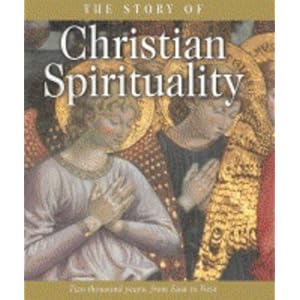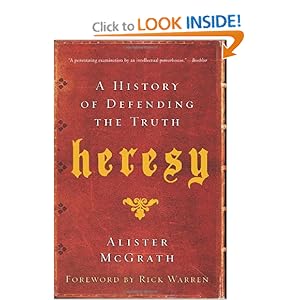Yes, I do find much that I agree with in Odin's 2nd-career approach. And I also like the attention he gives to ancient writings of the Church Fathers. In some way, it is interesting to read that some of the theological issues of the last few decades, were also written about several centuries ago.
There is much to gain from reading the Fathers. But (and this is not an attack, more a note concerning the topic) their writings are explicitly theological in nature. One cannot escape theology, even by returning to the early writings.
I believe that we fall in and out of heresies, or perhaps just errors or "corners" as you mention below, without really realizing it, largely because of a general apathy or ignorance of historical theology. To that end, I HIGHLY commend Gregg Allison's new work, "Historical Theology," where he traces Grudem's systematic topics through history to see major developments and views, including a very helpfully researched compendium of original source document quotes.
http://www.amazon.com/dp/0310230136/?tag=baptis04-20
However, I do not understand the following comment you made about Odin and the OP. Perhaps you can speak more about this.
Only that the OP was in favor of experience and the Bible alone... Admitting the Fathers of the Church as source material goes back on the original premise that "theology" is a problem, for the Church Fathers ARE theology! While some of their work is narrative or historical in nature, most is indeed pure theology, albeit of a different era with often different worldviews from which inferences are drawn, but theology nonetheless.
Note that I am not "against" the reading of the Church Fathers! MUCH is to be gained from understanding (or even just acknowledging) their contribution to our current state of theological affairs. We have not crafted an orthodox Christian worldview ex nihilo in this era. We stand on the shoulders of those who came before, and if anything, we merely hone arguments and propositions that have been with the church since its inception.
On that note, one thing very helpful for modern theology is the simple fact that we are now better equipped to grasp the original languages than were many of the Fathers of the Church -- especially after 300 AD when Latin was the rule of the day, not Greek and Hebrew. Much was lost during the Dark Ages and Medieval periods and the Enlightenment period was virtually "lit" by the rediscovery of the ancient tongues and documents! We now have 500 years of enlightenment scholarship brought to bear on OT and NT documents, plus the aid of powerful computers that can "crunch" more morphology in 10 minutes than a doctor of the church in a lifetime. In other words, we can epistemologically "know" with more surety now than most of the Fathers of the Church down through the ages could know based on the efforts of those who have devoted their life to the study of God and God's Word/languages/culture, etc.
I am interested in the concept of the primitive church--contemporary churches modeling the first century church. ... I know that is not your current church involvement, but I still would like to read your comments.
The two are firmly intertwined, much like a fiber rope!
There is much ado these days about returning to a primitive church model. That is fine, except that we ought to pay careful attention to two words, "description" and "prescription" in those efforts. To go out and model a persecuted house church because that is the "description" in Acts would be to make an error that doesn't have to be made. That same house church can also be shown meeting corporately when possible, and at the very instant that the church was not persecuted to death it branched out into large gatherings almost immediately, as was the normal practice inherited from the Temple of Jerusalem and the synagogue of the rest of Israel prior to the founding of the church.
Other practices such as liturgy, vestments, lighting (candles, etc.) may be as much cultural as "proscribed." In fact, there are very few "prescriptions" for the actions of a local church in Scripture. Most of what we know is gathered by the writings of the Fathers and by archeology, not from Scripture, which is largely silent on church practice. We know reading Scripture, OT and NT. We know singing songs, hymns, and spiritual songs. We know preaching. We know the Lord's Table and Baptism. But after that, we really don't know... Even our forms are largely traditional versus prescribed.
All that being said, my current church is more closely aligned with what IS known of the primitive church than of a modern church. We have vetted what can be known from Scripture and have built our congregation accordingly. We are culturally immersed in this era, and with a particular people group that we are reaching, but our practice hearkens back to Scripture and the primitive church.
Oh, and primitive doesn't have to me no sound system or no creature comforts. It is more a "state of being" than "stuff."
I am serious about wanting to learn about what appears to be a Calvinist/Reformed Baptist theology-based faith. I don't want to argue it--just learn about it and understand the perspective.
For that, I commend you (honestly!). We ought to each strive to simply learn of the various doctrines and methods used by our brothers and sisters in Christ. Learning is not the same as "believing" and while we may hold a different point of view or interpretation, we ought not rip our kin folk to shreds! Especially before we even expend the energy to learn what it is that they hold. We may even end up modifying some of our own convictions as we are exposed to a wider worldview.
You were correct about one thing in your last post directed to me. Currently, I am experiential in matters of my personal faith, my personal spirituality. Those that attempt to describe this faith approach as emotional have got it all wrong. ... I began to seek out corners in the Christian faith. After 2000 years, there have been many corners in Christianity. There is a lot of good stuff in the corners.
I believe that many of us have learned and grown when we were exposed to various practices in and out of God's church. I have sought out a LOT of various perspectives in and out of the church and have attended many different types of services of worship and read about TONS more, including in-depth reading about cults and other religions and philosophies. Ignorance helps no one, and those who operate with their heads in the sand are really no great help at all -- even in their pious attitudes, often born out of pride of segregation instead of humility at the greatness of God working through all sorts of people.
BUT... Some of those "corners" were and are "corners" for a reason. They end up at dead ends and the congregations never withstood the test of time, which suggests at a bare minimum that the Holy Spirit did not carry them forward into the mainstream. That ought to be at least a consideration in such an investigation!
Well, last night she announced she is a closet fundamentalist and wants to seek the most fundi-fundamentalist in town.
Here, I enter the realm of pure speculation... I would suspect that there is an effort afoot to draw very near to God by legalistic means. "Doing" for God seems like the right road to take, and the more serious the effort, the more right it can seem. In some cases, that is appropriate. For instance, as has already been brought out in this thread, we cannot study God too much, and we cannot love God too much! But, I believe that we can "work" too much to satisfy God in ways that are not always Scriptural...
And, I find the fundamentalist (versus congregations that focus on the fundamentals of the faith -- two different things!) congregations to be doing just that -- working too hard to appease God in order to find some sort of blessing. It is interesting that in a survey of historical movements of the church that the radical fundamentalists also end up becoming the most anti-nomian at the end of the day, and after observation of many persons and churches. It would seem that their zeal is misplaced by looking TOO much on man and not enough on God! Hope that is taken in the right spirit, but I've seen it time after time in an experiential nature as well. When it all comes down to us to DO then when we fail, we often fail BIG. God, however, never fails, and keeping our focus on Him, as did our Savior, we don't get led into false concern over minutiae by observation of each other quite so much. Our faith is rightly placed on Christ alone.
I may be coming to Southern Seminary sometime this summer. I am doing some research on one of my wife's ancestors who was a Baptist preacher (United Baptist) circa 1830s. I have heard the library at Southern Seminary has some items from that time period in their special collections and vertical files. Send me a PM if you want to meet and have a cup of coffee during my visit.
I would LOVE to get together with you during your visit! I manage the grounds at Southern and am almost always on campus. I will be doing a bit of traveling over a couple weekends in July and have my son's wedding in Wisconsin in August, but otherwise, I'm anchored for now! Shoot me a message when you're firming up your plans!
The library has a LOT of stuff... Our archives feature all of Spurgeon's collection and a lot of other influential pieces. It is a treasure-trove with over 1 million pieces.







